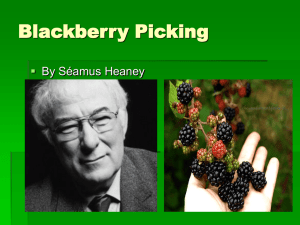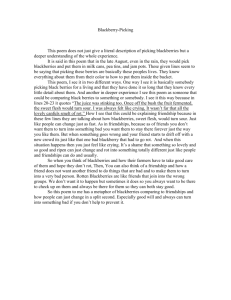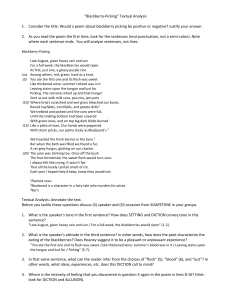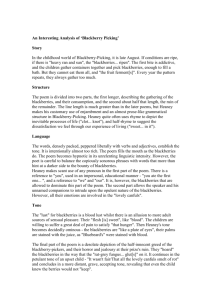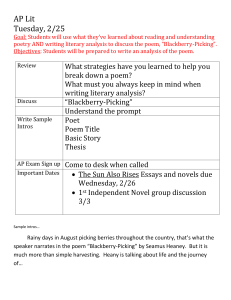English Literature and Composition_Seamus Heaney
advertisement
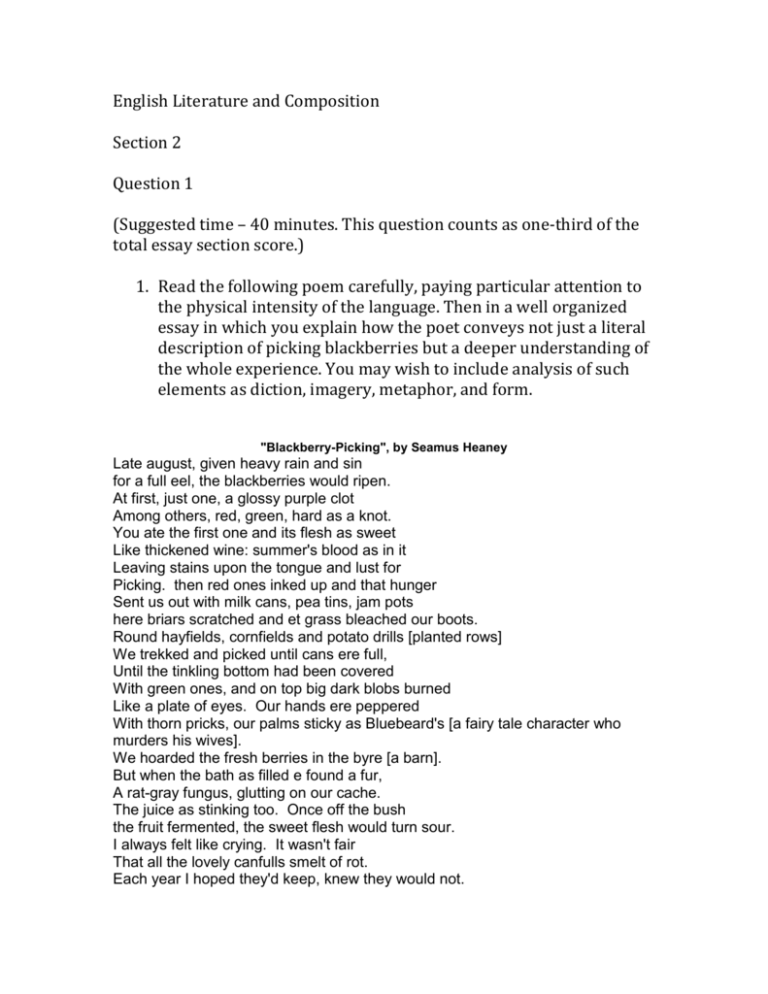
English Literature and Composition Section 2 Question 1 (Suggested time – 40 minutes. This question counts as one-third of the total essay section score.) 1. Read the following poem carefully, paying particular attention to the physical intensity of the language. Then in a well organized essay in which you explain how the poet conveys not just a literal description of picking blackberries but a deeper understanding of the whole experience. You may wish to include analysis of such elements as diction, imagery, metaphor, and form. "Blackberry-Picking", by Seamus Heaney Late august, given heavy rain and sin for a full eel, the blackberries would ripen. At first, just one, a glossy purple clot Among others, red, green, hard as a knot. You ate the first one and its flesh as sweet Like thickened wine: summer's blood as in it Leaving stains upon the tongue and lust for Picking. then red ones inked up and that hunger Sent us out with milk cans, pea tins, jam pots here briars scratched and et grass bleached our boots. Round hayfields, cornfields and potato drills [planted rows] We trekked and picked until cans ere full, Until the tinkling bottom had been covered With green ones, and on top big dark blobs burned Like a plate of eyes. Our hands ere peppered With thorn pricks, our palms sticky as Bluebeard's [a fairy tale character who murders his wives]. We hoarded the fresh berries in the byre [a barn]. But when the bath as filled e found a fur, A rat-gray fungus, glutting on our cache. The juice as stinking too. Once off the bush the fruit fermented, the sweet flesh would turn sour. I always felt like crying. It wasn't fair That all the lovely canfulls smelt of rot. Each year I hoped they'd keep, knew they would not. Student Responses Read the following real student responses. All grammar, style, spelling etc. errors were part of the original student essays. Then, assign a grade using the rubric provided below. Essay Z Picking blackberries is not my idea of a good time. Along it the hot sun shining down on you, you also have to worry about the vines, thorns, and dreaded insects. In Seamus Heaney's "Blackberry-Picking," the narrator battles all of these things and is rewarded with delicious blackberries. Through the author's use of imagery and metaphors, the reader gets a better understanding of blackberry picking. "Where briars scratched and wet grass bleached out boots" is just one example of the many images in the poem. The above images describe what the people go through to get the prized blackberries. "Our hands were peppered with thorn pricks, our palms sticky as Bluebeard's" also describe the trials right before the exuberation of eating the blackberries. Unfortunately, all good things must come to an end. The line, "But when the bath as filled we found a fur, a ray-grey fungus" is a blow to those who have worked so hard to get the blackberries. They are rotting. In summation, these images detail the hard work that happens every summer just to collect blackberries. Metaphors are used to describe the blackberries. The following metaphors all describe the juicy berry: "glossy purple clot," thickened wine," dark blobs," and "hard knot." These metaphors are used to entice the reader. The more detailed the metaphors are, the more "dark blobs" the reader wants to eat. In conclusion, imagery and metaphors recreate a sunny, summer day full of the trials and joys of picking blackberries. Essay Y Nearly everything in life eventually comes to and end. Seamus Heaney depicts this advancement of time in "Blackberry Picking" by combining both pleasing and harsh words to describe the blackberries at the time they ere picked and at a later date. the poem begins with a straight forward description of the act of the blackberries maturing. "Late August, given heavy rain and sun/ For a full week, the blackberries would ripen" (ll 1-2). These opening lines set a mood of peacefulness and tranquility which ill soon be broken. Just after these opening lines, Heaney incorporates a change in diction to words that do not induce a lovely image in the reader. Such words as "flesh," "blood," and "lust" contrast starkly it the readers conception of an innocent picking of blackberries. thus, Heaney continues his poem with the sole purpose of showing the darker side of a supposed pleasant occasion and alluding to the inevitable passage of time. Heaney's use of extremely descriptive imagery is important to rope the reader in. e feel as though e can see the "glossy purple clot" (l 3) and taste the "flesh [which as] sweet/like thickened wine" (ll 5-6). this use of olfactory and visual imagery enhance the readers perception of the act being performed. this imagery also allows the reader to become more involved in the story and better able to imagine the emotions of the speaker. After the reader has visualized blackberries "red, green, hard as a knot" (l 4) and "briars scratch[ing] and et grass bleech[ing] our boots" (l 10) it becomes much easier to also feel melancholy emotions, as does the speaker, hen these berries are gone. "I always felt like crying" (l 22) takes on meaning that the reader can relate to hen e also feel as if e are there. Heaney's use of extremely odd metaphors such as "plate of eyes" (l 15) and a "rat-grey fungus" (l 19) seem to shock the reader out of an accustomed ay of thinking about a serene and placid event such as picking blackberries. Heaney points out that while these blackberries being joy now, the harsh diction forebodes that they ill not always. By using dark diction that is not very pleasing t the senses, Heaney places an aura of disturbance even in the beginning of the poem hen the reader does not expect anything out of the ordinary to occur. The second stanza truly expresses the speaker's inner emotions about this time of berrypicking. the diction becomes even more disgusting than previously with one line containing "fermented", "Flesh" and "Sour" (l 21). It becomes obvious that the already distorted descriotuon of picking blackberries is about to become even more strange. For the first time in the poem, the speaker uses first person to convey a feeling: "I always felt like crying" (l 22). This line is intrinsic to the poems meaning because it shows the sorrow that accompanies the passage of time. The speaker feels like crying because the "fresh berries" (l 17) were no turning to "lovely canfuls [that] smelt of rot" (l 23). Ultimately, Heaney wishes to depict the beauty of youth through the "sweet" blackberries then contrast it with old age which he represents with the "far-grey fungus glutting on our cache" (l 19). All that we have no ill eventually turn to rot then e must go and find more. The last line of the poem portrays the hopelessness with which Heaney views life when he says: "EAch year I hoped they'd keep, know they would not" (l 24). The poem ends on a note of pointlessness, as if the author ill always hope the berries keep, yet they never will. Essay III In "Blackberry-Picking," Heaney describes the process of picking blackberries. The poet uses different resources of language to paint a picture of what is occurring. Even though the poem does give a literal description, the speaker also gains a deeper understanding from the whole experience. This is shown through diction, imagery, and figurative language. The poet uses words such as "glossy purple clot" to give an image of the blackberries. The picking time is one where "briars" ill scratch and is done in the morning when the "wet grass bleached" the boots. The speaker uses a simile in line 16 in order to show that the blackberry juice leaves their hands as "sticky ad Bluebeard's". The diction as well is used to further the description. The intense emotions that are felt in picking, the "hunger" for the blackberries, is the driving force. "Sweet" is used to describe the flavor as one picks a blackberry and let the juice leave "stains upon the tongue." Imagery is shown once again when the "lovely canfulls smelt of rot" due to the quick fermentation of the blackberries. Although this poem is about an actual event, the speaker is also expressing a deeper understanding. Blackberry-picking occurs in "Late August," so it is the end of summer. Blackberries serve as a symbol announcing the end. The diction that the poet uses explains a "lust" for picking and gives a grasping quality to picking time. Each moment is filled with a "hunger" to get more and more blackberries. In the end of the poem the speaker feels "like crying" because he has come to the conclusion that this is the end of summer and despite his hope that the blackberries would stay fresh forever, they do not. This can be paralleled to the deeper meaning that despite the hope that summer ill not end, the end also ill come. Heaney uses many different language devices to convey a description of picking blackberries. The imagery is used to focus on the literal aspects of picking. Diction is more commonly used to give a deeper meaning to the experience and show the speaker's feelings of hat his ne understanding means to him. Essay J The boy who enjoyed the fruit of nature so much that he wished to with hold the forces of nature and keep his "blackberry's" fresh. The poem showed how mankind would try in vain to entrap the wonderous power of nature and fail to ever equal nature. People are filled with natural tendances to be greedy, slovenly, and unlearned. The average man sees riches and takes hat he needs for the time being but, also rips from others what he believes he may someday long for. The natural order though only allows man hat ne needs and reissues the surplus to the remaining needy people. The boy tried to relegate the flow of nature while in fact nature relegate the entire world. The "Blackberry-Picking" could be used to show any situation in which man strived to reach the peak of the mountain so hard that he went over the top of it and began to degress back to the level of which he began.
